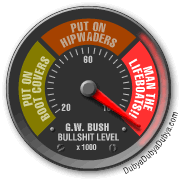Obama: The 500 Million Dollar Man
Via: ABC News
 Barack Obama's refusal of public financing for his campaign opens up the possibility for him to outspend John McCain by 3-to-1 or more in the general election. With the possibility of spending perhaps $500 million just in the final two months of the campaign, Obama will be the first major-party candidate to enjoy a spending edge in the general election in more than 30 years. The comparison with the consistently cash-strapped McCain campaign could hardly be more stark.
Barack Obama's refusal of public financing for his campaign opens up the possibility for him to outspend John McCain by 3-to-1 or more in the general election. With the possibility of spending perhaps $500 million just in the final two months of the campaign, Obama will be the first major-party candidate to enjoy a spending edge in the general election in more than 30 years. The comparison with the consistently cash-strapped McCain campaign could hardly be more stark. While McCain, who on Thursday said he will accept public financing, will be limited to spending only $84.1 million between the Republican National Convention and Election Day, Obama will be free to raise and spend unlimited amounts — with advertising specialists and party insiders projecting that he will bring in hundreds of millions of dollars, utilizing and expanding on the most efficient fundraising operation in American political history.
Some party strategists say Obama could use his immense cash advantage to run a national ad campaign akin to marketing drives run by companies like McDonald's and Nike, while simultaneously engaging in targeted, state-level organizing that could leave McCain on the defensive in states that have rarely been competitive in years past.
Yesterday, Obama released his first ad since wrapping up the Democratic nomination, and it hints at the potential scope of ad buys to come. The ad is running in 18 states, including perennial Republican strongholds Alaska, Indiana, Montana, North Carolina, and North Dakota, as well as classic swing states Florida, Michigan, Ohio and Pennsylvania.
"If the ad buy looks like this in October, this election's over," said Ken Goldstein, director of the Wisconsin Advertising Project at the University of Wisconsin-Madison. "He's competing in red states, and he doesn't even feel he needs to advertise in blue states."
Labels: barack obama, campaign finance, John McCain















